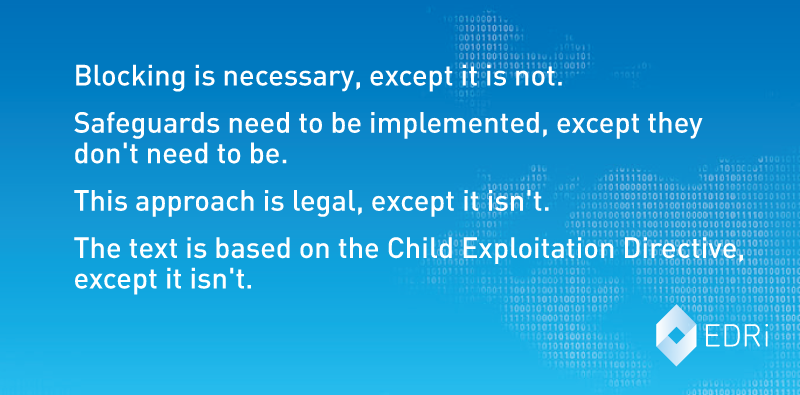Terrorism and internet blocking – is this the most ridiculous amendment ever?
After months of closed-door, secret negotiations, the European Parliament’s civil liberties committee will vote tomorrow, on 21 June, on the planned Directive “on combating terrorism”. Although internet blocking was not part of the initial proposal and appears to fall outside the purpose of the Directive (harmonisation of criminal law), the committee will vote on a “compromise” amendment that also includes blocking and deleting online content.
Why is this proposal ridiculous?
(1) The proposed text appears to say that internet blocking is “necessary” – with no evidence whatsoever being provided to back up this claim. However, the text also implies that blocking is not necessary, as countries “may” (and therefore don’t need to, if they don’t want to) introduce internet blocking.
(2) The proposed text says that if restrictions are imposed on availability of information, then “adequate safeguards” must be implemented. However, it also says this is “without prejudice to voluntary action”. This means that safeguards are not needed, if companies can be persuaded to block content on a voluntary basis.
Is it acceptable to avoid safeguards by persuading companies to implement measures “voluntarily”? Obviously not. The Organisation for Security and Cooperation in Europe (OSCE) has said that such voluntary restrictions
will be in breach of Article 10 [of the European Convention on Human Rights] unless the requirements of Article 10(2) are fulfilled, and the necessity for interference is convincingly established.
Similar analysis has also been produced for the Council of Europe.
(3) The “compromise” amendment was proposed and justified on the basis that it was copying the Child Exploitation Directive. Except… it does not.
So, there you have it: Blocking is necessary, except it is not. Safeguards need to be implemented, except they don’t need to be. This approach is legal, except it isn’t. The text is based on the Child Exploitation Directive, except it isn’t.
Is this really how we are going to create credible legislation on terrorism?

Text of the European Parliament’s compromise amendment (COMP 6: Compromise on removing illegal content):
Recital 7a (new) (cf Directive on Combating the sexual abuse and sexual exploitation of children and child pornography)
“(7a) An effective mean of combatting terrorism on the Internet is to remove illegal terrorist content at source. In that context, this Directive is without prejudice to voluntary action taken by the Internet industry to prevent the misuse of its services or to any support for such action by Member States, such as detecting and flagging illegal content. Member States should take all necessary measures to remove or to block access to webpages publicly inciting to commit terrorist offences. Where such measures are taken, they must be set by transparent procedures and provide adequate safeguards under the control of independent authorities. Member States should use their best endeavours to cooperate with third countries in seeking to secure the removal of such content from servers within their territory. However when removal of illegal content at its source is not possible, Member States may put in place measures to block access from the Union’s territory to Internet pages identified as containing or disseminating terrorist content. Member States should consider legal action against internet and social media companies and service providers, which deliberately refuse to comply with a legal order to delete from their internet platforms illegal content extolling terrorism after being duly notified about such specific content. Such refusal should be punishable with effective, proportionate and dissuasive sanctions. The right to judicial review should be guaranteed to the internet and social media companies and service providers.”
Article 14a (new) (cf Directive on Combating the sexual abuse and sexual exploitation of children and child pornography)
Measures against illegal terrorist content on the internet
“1. Member States shall take the necessary measures to ensure the prompt removal of illegal content publicly inciting to commit a terrorist offence, as referred to in Article 5, hosted in their territory and to endeavour to obtain the removal of such content hosted outside of their territory. When that is not feasible Member States may take the necessary measures to block the access to such content.
2. These measures must be set by transparent procedures and provide adequate safeguards, in particular to ensure that the restriction is limited to what is necessary and proportionate and that users are informed of the reason for the restriction. Measures on removal and blocking shall be subject to judicial review.”

